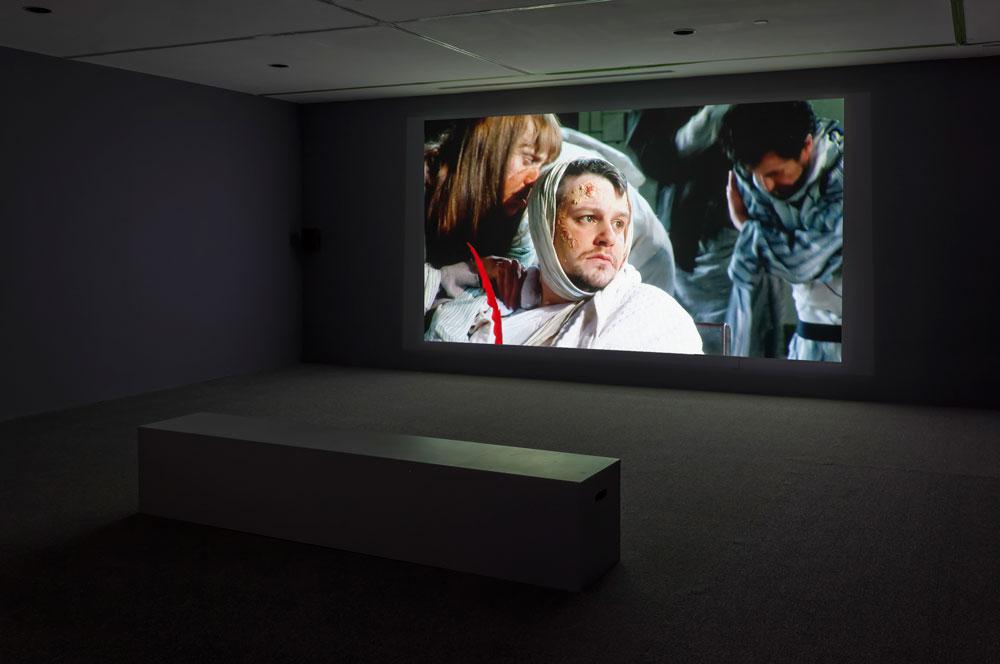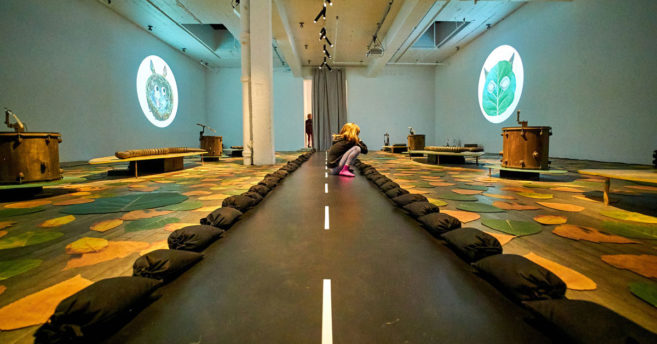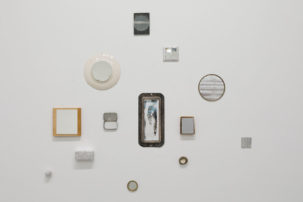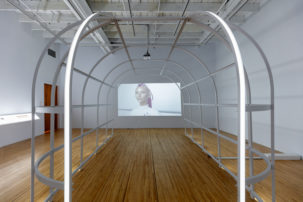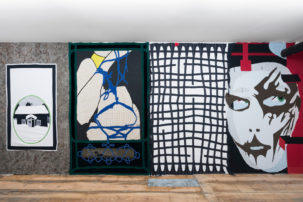“We invented the revolution, but we didn’t know how to run it.”
That’s just one of the provocative lines in Marat Sade Bohnice, a new film by Althea Thauberger which addresses mental illness, art therapy and experimental theatre, among other concerns.
One thread of the work relates to radical journalist Jean-Paul Marat, a vigorous voice of the French Revolution, who was assassinated in his home in 1793 while convalescing from a serious skin disease.
Another thread of the work relates to libertine author the Marquis de Sade, who was declared insane in 1803 and who was encouraged to write and stage plays as part of his therapy at a Charenton, France, asylum.
A third thread of the work relates to Peter Weiss’s 1963 play-within-a-play The Persecution and Assassination of Jean-Paul Marat as Performed by the Inmates of the Asylum of Charenton Under the Direction of the Marquis de Sade. Also known as Marat/Sade, Weiss’s play is based on a scenario where one of the plays de Sade wrote at Charenton might have related to Marat.
A fourth thread of the work is Bohnice Psychiatric Hospital, one of the Czech Republic’s largest psychiatric facilities. Recently, Thauberger and the experimental Prague theatre company Akanda staged a performance of Marat/Sade at the Bohnice hospital for an audience of hospital patients and staff, as well as members of the public.
The resulting Thauberger film on view at the Power Plant—THE PERSECUTION AND ASSASSINATION OF JEAN-PAUL MARAT AS PERFORMED BY THE INMATES OF THE ASYLUM OF CHARENTON UNDER THE DIRECTION OF THE MARQUIS DE SADE AS PERFORMED BY THE PRAGUE-BASED EXPERIMENTAL THEATRE COMPANY AKANDA FOR THE PATIENTS AND STAFF OF THE BOHNICE PSYCHIATRIC HOSPITAL, aka Marat Sade Bohnice—consists of filmic documentation of the Bohnice hospital performance, as well as documentation of Thauberger’s interviews with Bohnice patients and staff.
As Thauberger brings various threads together—particularly as she includes hospital staff and residents in the work—she inserts a raw humanism into her deep-time inquiry of mental illness, pointedly linking Marat’s revolutionary apprehension to growing contemporary cynicism about institutions such as the Bohnice hospital, collapsing each mood onto the other.
Thauberger’s choice to stage the work in the Bohnice hospital’s decommissioned waterworks and laundry facility—which the gallery’s press release indicates is a post-revolutionary structure—is highly apt. De Sade, and to a certain extent Marat, lived during a time which saw a change in the way mental illness was viewed—namely, as less of a criminal concern requiring punishment, and more of an ailment to which therapy could be applied.
Today, institutions like the Bohnice hospital are undergoing flux yet again. As acting hospital director Martin Holly says in his interview with Thauberger, he is invested in the growing trend towards deinstitutionalization. A believer in what he calls an “over the wall approach,” he agreed to Thauberger’s cultural project.
As Marat, during the 18th century, advocated resolutely for the poorest members of society, Thauberger herself, while resting the work within a plethora of rich historical associations, centres her gaze on the corporeal, inevitably fallible human being and provides voice to today’s ostracized. “It doesn’t just give, it also takes,” says one of the hospital patients regarding a prescribed pharmaceutical.
In regards to its humanitarian aspect, Thauberger’s film calls to mind other, more traditional, documentaries, like Zeina Daccache’s illuminating 2009 feature 12 Angry Lebanese. In it, Daccache shows us a drama/art therapy project in Lebanon’s notorious Roumieh Prison during which patients adapted Reginald Rose’s 1954 teleplay 12 Angry Men. The tenor of Thauberger’s project also brings to mind Johnny Cash’s legendary performances at Folsom State Prison in California on January 13, 1968, which were documented in a best-selling album.
The socially conscious élan embedded into Thauberger’s experimental documentary is not surprising; over the last decade, Thauberger has favoured an interventionalist method of collaborating with distinct social enclaves, be it by creating photographs with treeplanters at isolated, fly-in wilderness spots in Western Canada, or by making a film with youth conscripted to Germany’s civil service. In these projects, just as in Marat Sade Bohnice, Thauberger offers her subjects a means of exploring base facets of their identities in relation to the society in which they live.
In her body of work, Thauberger serves up a messy world, highlighting the various tensions that exist between individuals and society, haves and have-nots, and those judged sane and insane. Issues of individuals and community are particularly coterminous in a moment during Marat Sade Bohnice when a patient speaks of mental illness as a “sensitive indicator of problems in society”—the end result of a “series of small tragedies,” to quote Charles Bukowski.
In wise acknowledgement of this complexity, Thauberger sets up a reflexive and transparent method, leaving the work purposefully ungilded—cameras, for instance, are often plainly seen in shots, while booms frequently dip into the frame. At other points, Thauberger overlaps interviews with scenes of the play, or chops the play up through the use of blatant intertitles. These techniques negate full audience immersion in the play’s narratives, instead shifting awareness towards the work’s social praxis.
In the end, Thauberger unearths a culture of denial bent on moral certitudes, a context in which societal ailments are affixed to the individual. As poignantly remarked upon by a patient following a long period of time locked away, “and so here [in Bohnice], I just sort of existed.”
With Marat Sade Bohnice, Thauberger humanizes those hidden from society and suggests an alarming congruency between the past and present. Over time, she suggests, our stories do not evince progress, but rather a sense of perennial misgiving and mistake.

